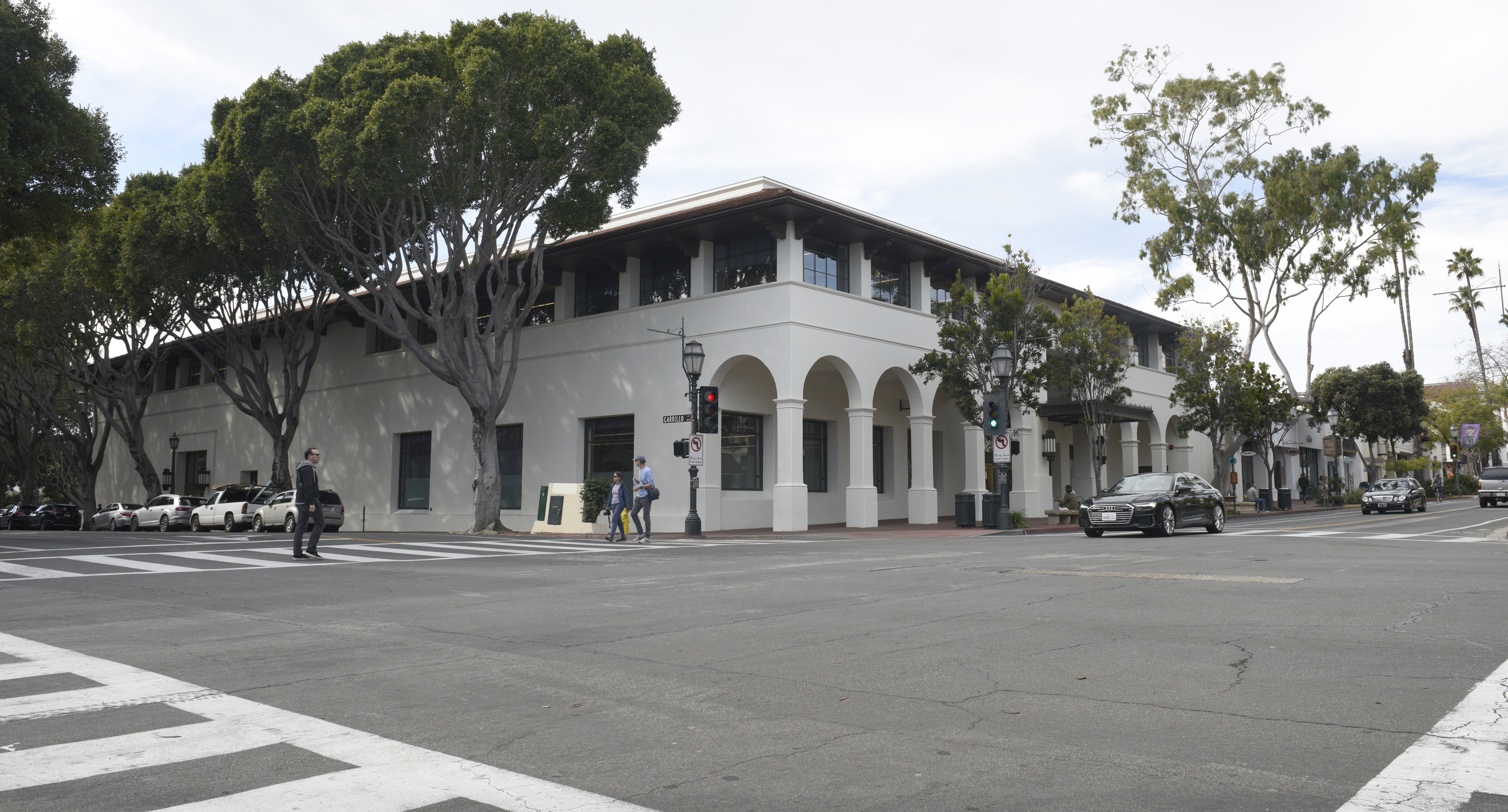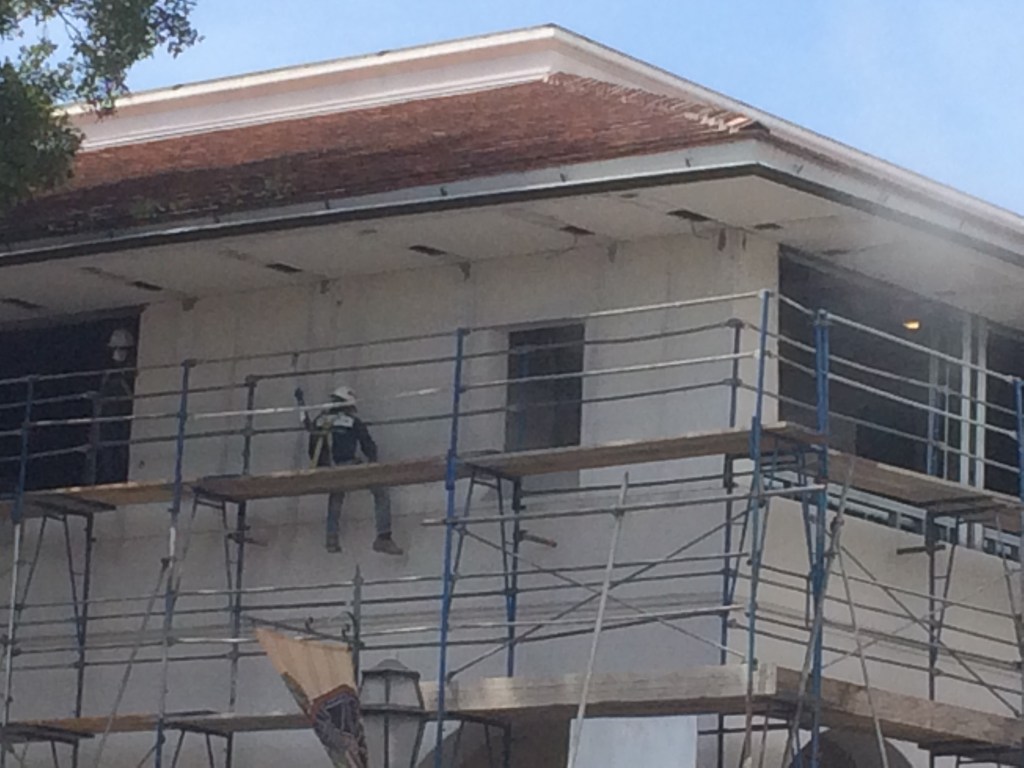Amazon Moves to State Street
Will the Tech Giant’s Arrival Turn Out to Be a Beautiful Day in the Neighborhood?

The anticipated opening of Amazon’s new State Street office on Monday morning, January 6, was a modest affair, at least from appearances. As a homeless couple watched from a nearby bench, smartly dressed employees quietly entered the white stucco building, passing a security sensor in the front lobby and a table set up with mimosas and “Day 1” balloons. They disappeared behind walls of frosted glass while a smiling receptionist accepted a reporter’s business card and promised a representative would call him later to answer questions about the company’s Santa Barbara operations.
The call never came, but online job listings and the tech giant’s renovation permit for the former Saks Off Fifth store reveal that the company will be employing around 300 research and development staff with Huxleyan titles such as “Knowledge Architect” and “Machine Learning Engineer.” They will be working here on Alexa, Amazon’s voice-activated virtual assistant. Many came from the company’s Cambridge Development Centre in England. Others were relocated from just a few miles away at Graphiq, the Summerland-based data analytics and search engine startup that Amazon bought in 2017.
“We collaborate daily with our incredibly talented team to ensure Alexa understands different sentence structures and answers with accurate information,” said Gabrielle G. on Amazon’s website. “The challenge is making this work across 7 different languages.” Cody O. oversees Alexa’s “Global Knowledge Engineering” team out of the State Street office. He’s a strong adherent of the company’s “Deliver Results” and “Are Right, A Lot” leadership principles, the site says. While exact salary figures are difficult to come by, the positions are apparently well-paying. Realtors say Amazon employees can afford Santa Barbara’s high housing prices, and more than one local family has complained they’ve lost their domestic help to better offers.
But as these employees settle into their new office space, their corporation is already struggling to ingratiate itself with regional business owners. On Tuesday, it turned out, Amazon narrowly escaped being sued by Sonos, the international wireless speaker corporation developed, founded, and headquartered in Santa Barbara. But it definitely stepped into controversy when it decided to sponsor a popular Santa Barbara event, thereby managing to insult many of its State Street neighbors.
Ironically, the organization responsible for smoothing relations may have caused the problem. To the surprise and dismay of many, Downtown Santa Barbara — a marketing and promotions body for dues-paying business members — announced Amazon is now its lead sponsor for the monthly arts and culture event called 1st Thursday. Montecito Bank & Trust was the previous sponsor. An email newsletter and a page on the Downtown Santa Barbara website making the announcement gives Amazon top billing, with its logo printed bigger and bolder than any other. Amazon paid $10,000 for the positioning, which will run through the year.
Whether it’s just a bit of a dust-up or a more damaging decision by the organization is now a topic of debate, and there are strong feelings on both sides. “How out of touch do you have to be to turn a locals-only event into a marketing tool for our biggest competition?” asked Bob Ficarra, who operates the Metro Entertainment comic store on Anapamu Street. Amazon has contributed to the demise of retail centers across the country, and State Street, with its record number of empty storefronts, is no exception. “I’ve owned Metro Entertainment for 29 years, and this very well could be the biggest slap in the face I’ve ever seen,” Ficarra said. “Why am I paying quarterly taxes to an organization that is actively working against and hurting my local business?”
Tamara Erickson, CEO of Hotel Santa Barbara and a member of the Downtown Santa Barbara board, had a more nuanced reaction. “Any large corporation moving into a small town brings a mix of good and bad, and Amazon is no exception,” she said. “The optics of Amazon sponsoring downtown events aren’t great and perhaps next time it can be done in a less splashy way. But do we want their 300 employees eating and shopping downtown? Sure. Are we also worried that they may overwhelm the housing market and rents will spike like they did in the Bay Area? Yep.” But the bottom line is, they’re here, Erickson said. “The best we can do is be good neighbors and hope their financial and other contributions do more to help downtown at a time when we really need it.”
Outgoing City Councilmember Randy Rowse said Santa Barbara should be thankful Amazon has chosen to invest here, as it’s creating good-paying jobs that will pump up the economy. Their presence downtown is exactly the kind of revitalization State Street needs. Plus, Rowse went on, 1st Thursday is one night of the month. Amazon isn’t trying to take over the entire community. “It’s not like they built a statue downtown and said, ‘This is George Amazon. Everyone pray to him.’”
Carrie Kelly, Downtown Santa Barbara’s executive director, defended the sponsorship decision. “While a national organization, by taking a large vacancy on State Street, they are employing local residents who will shop at local businesses, dine at local restaurants, and add to the vitality and vibrancy of our downtown,” she said.

Meanwhile, Downtown Santa Barbara is starting a new program this week called Discover Downtown: Shop A Block Giveaway, Kelly said. The 1000 block will be highlighted first; Amazon is located at 1001 State Street. To enter the program, shoppers will need to spend $100 at two or more businesses between January 10 and January 31, then bring their receipts to the Santa Barbara Travel Bureau, where they will be entered to win a ticket up to $1,000 in value on United Airlines within the continental U.S., Mexico, Canada, the Caribbean, and Central America. “I hope residents will come discover a restaurant or business they have never been in before,” Kelly said.
Amid these discussions came the other piece of business news that could eventually pit Amazon against Sonos. A day after Amazon opened on State Street, the home-grown Sonos filed a federal lawsuit against Google for allegedly infringing on five of its patents for connecting and synchronizing wireless speakers. Sonos said it would have sued Amazon, too, as both companies allegedly stole their designs to manufacture their own, cheaper speakers, but could only afford to take on one Big Tech entity at a time.
Sonos executives said they used a digital sleuthing technique called “packet sniffing” to determine Amazon’s Echo speakers copied their design. Beyond the patents, Sonos, which also employs hundreds of Santa Barbara workers and has its own frosted-glass headquarters on Chapala Street, are charging that Google and Amazon are using their intellectual property to flood the market with less-expensive devices that do more than just play music — they sell goods, play ads, and listen to our conversations. Sonos’s cheapest speakers start at $200; Amazon and Google offer theirs for $50. In the third quarter of 2019, Amazon shipped 10.5 million units; Sonos sold 6.1 million.




You must be logged in to post a comment.